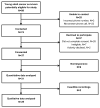Cancer experiences and health-related quality of life among racial and ethnic minority survivors of young adult cancer: a mixed methods study
- PMID: 27435322
- PMCID: PMC5083156
- DOI: 10.1007/s00520-016-3340-x
Cancer experiences and health-related quality of life among racial and ethnic minority survivors of young adult cancer: a mixed methods study
Abstract
Purpose: Young adult (YA) racial and ethnic minority survivors of cancer (diagnosed ages 18-39) experience significant disparities in health outcomes and survivorship compared to non-minorities of the same age. However, little is known about the survivorship experiences of this population. The purpose of this study is to explore the cancer experiences and health-related quality of life (HRQOL) among YA racial/ethnic minorities in an urban US city.
Methods: Racial and ethnic minority YA cancer survivors (0 to 5 years posttreatment) were recruited from a comprehensive cancer center using a purposive sampling approach. Participants (n = 31) completed semi-structured interviews, the FACT-G (physical, emotional, social well-being) and the FACIT-Sp (spiritual well-being). Mixed methods data were evaluated using thematic analysis and analysis of covariance (ANCOVA).
Results: The majority of survivors were women (65 %), single (52 %), and Hispanic (42 %). Across interviews, the most common themes were the following: "changes in perspective," "emotional impacts," "received support," and "no psychosocial changes." Other themes varied by racial/ethnic subgroups, including "treatment effects" (Hispanics), "behavior changes" (Blacks), and "appreciation for life" (Asians). ANCOVAs (controlling for gender and ECOG performance status scores) revealed that race/ethnicity had a significant main effect on emotional (P = 0.05), but not physical, social, or spiritual HRQOL (P > 0.05).
Conclusions: Our findings suggest that minority YA cancer survivors report complex positive and negative experiences. In spite of poor health outcomes, survivors report experiencing growth and positive change due to cancer. Variations in experiences and HRQOL highlight the importance of assessing cultural background to tailor survivorship care among YA racial and ethnic minorities.
Keywords: Cancer; Disparity; Health-related quality of life; Minority; Survivorship; Young adult.
Conflict of interest statement
The authors have no financial disclosures or conflicts of interest to report. We have full control of all primary data and agree to allow the journal to view the data if requested.
Similar articles
-
Racial and ethnic disparities in neurocognitive, emotional, and quality-of-life outcomes in survivors of childhood cancer: A report from the Childhood Cancer Survivor Study.Cancer. 2019 Oct 15;125(20):3666-3677. doi: 10.1002/cncr.32370. Epub 2019 Jul 10. Cancer. 2019. PMID: 31291014 Free PMC article.
-
Palliative care experiences of adult cancer patients from ethnocultural groups: a qualitative systematic review protocol.JBI Database System Rev Implement Rep. 2015 Jan;13(1):99-111. doi: 10.11124/jbisrir-2015-1809. JBI Database System Rev Implement Rep. 2015. PMID: 26447011
-
Calidad de Vida: a systematic review of quality of life in Latino cancer survivors in the USA.Qual Life Res. 2020 Oct;29(10):2615-2630. doi: 10.1007/s11136-020-02527-0. Epub 2020 May 19. Qual Life Res. 2020. PMID: 32430782 Free PMC article.
-
Reference values of the Functional Assessment of Chronic Illness Therapy-Spiritual Well-Being: a report from the American Cancer Society's studies of cancer survivors.Cancer. 2015 Jun 1;121(11):1838-44. doi: 10.1002/cncr.29286. Epub 2015 Feb 24. Cancer. 2015. PMID: 25712603 Free PMC article.
-
Disparities in cancer care among racial and ethnic minorities.Oncology (Williston Park). 2006 Sep;20(10):1256-61; discussion 1261, 1265, 1268-70. Oncology (Williston Park). 2006. PMID: 17024873 Review.
Cited by
-
Prevalence and correlates of skin examination among ethnically diverse young adult survivors of childhood cancer.Cancer Med. 2023 Apr;12(7):8557-8566. doi: 10.1002/cam4.5520. Epub 2022 Dec 9. Cancer Med. 2023. PMID: 36495004 Free PMC article.
-
Examining sociodemographic and health-related characteristics as moderators of an mHealth intervention on physical activity outcomes in young adult cancer survivors.J Cancer Surviv. 2024 Apr 12:10.1007/s11764-024-01577-4. doi: 10.1007/s11764-024-01577-4. Online ahead of print. J Cancer Surviv. 2024. PMID: 38607515
-
Psychological outcomes in ethnically minoritised adolescents and young adults with cancer: A systematic review.Clin Child Psychol Psychiatry. 2025 Apr;30(2):212-228. doi: 10.1177/13591045241301644. Epub 2024 Dec 17. Clin Child Psychol Psychiatry. 2025. PMID: 39688155 Free PMC article.
-
Fostering resilience in adolescence and young adulthood: Considerations for evidence-based, patient-centered oncology care.Cancer. 2024 Apr 1;130(7):1031-1040. doi: 10.1002/cncr.35182. Epub 2024 Jan 1. Cancer. 2024. PMID: 38163249 Free PMC article. Review.
-
An Evaluation of Racial and Ethnic Representation in Research Conducted with Young Adults Diagnosed with Cancer: Challenges and Considerations for Building More Equitable and Inclusive Research Practices.Curr Oncol. 2024 Apr 15;31(4):2244-2259. doi: 10.3390/curroncol31040166. Curr Oncol. 2024. PMID: 38668069 Free PMC article.
References
-
- Adolescent and Young Adult Oncology Progress Review Group. Bethesda, MD: US Department of Health and Human Services, National Institutes of Health, National Cancer Institute; and the LiveSTRONG Young Adult Alliance; Aug, 2006. [Accessed October 21, 2014]. Closing the Gap: Research and Care Imperatives for Adolescents and Young Adults with Cancer, Report of the Adolescent and Young Adult Oncology Progress Review Group. NIH Publication No. 06-6067. http:s/planning.cancer.gov/library/AYAO_PRG_Report_2006_FINAL.pdf.
-
- Bleyer WA, O’Leary M, Barr R, Ries LAG, editors. Cancer epidemiology in older adolescents and young adults 15 to 29 years of age, Including SEER Incidence and Survival: 1975–2000. Bethesda, MD: National Cancer Institute; 2006. NIH Pub. No. 06–5767.
-
- National Cancer Institute at the National Institute of Health. [Accessed January 7, 2015];A snapshot of Adolescent and Young Adult Cancers. www.cancer.gov/researchandfunding/snapshots/adolescent-you-adult. Updated November 5, 2014.
MeSH terms
Grants and funding
LinkOut - more resources
Full Text Sources
Other Literature Sources
Medical


